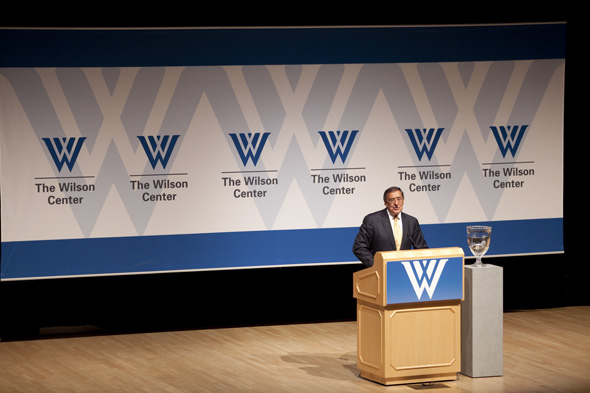Leon Panetta – newly minted secretary of defense and former director of the CIA – gave one of his first public policy addresses yesterday at the Woodrow Wilson Center addressing national security priorities amidst a
constrained budgeting environment (see
video here). Under the debt ceiling agreement recently agreed to by Congress, the Pentagon is expected to achieve
around $450 billion in spending cuts over the next 10 years.
Most of Secretary Panetta’s speech focused on “preserving essential capabilities,” including the ability to project power and respond to future crises, a strong military industrial base, and most importantly, a core of highly trained and experienced personnel.
But he also touched on the other two “D” s besides defense – diplomacy and development: “The reality is that it isn’t just the defense cuts; it’s the cuts on the State Department budget that will impact as well on our ability to try to be able to promote our interests in the world,” Panetta said in response to a question from ECSP Director Geoff Dabelko:
National security is a word I know that we oftentimes use just when it comes to the military, and there’s no question that we carry a large part of the burden. But national security is something that is dependent on a number of factors. It’s dependent on strong diplomacy. It’s dependent on our ability to reach out and try to help other countries. It’s dependent on our ability to try to do what we can to inspire development.
If we’re dealing with Al Qaeda and dealing with the message that Al Qaeda sends, one of the effective ways to undermine that message is to be able to reach out to the Muslim world and try to be able to advance their ability to find opportunity and to be able to seek…a better quality of life. That only happens if we bring all of these tools to bear in the effort to try to promote national security.
We’ve learned the lessons of the old Soviet Union and others that if they fail to invest in their people, if they fail to promote the quality of life in their country, they – no matter how much they spend on the military, no matter how much they spend on defense, their national security will be undermined. We have to remember that lesson: that for us to maintain a strong national security in this country, we’ve got to be aware that we have to invest not only in strong defense, but we have to invest in the quality of life in this country.
Panetta’s backing of diplomacy and foreign aid as an extension of U.S. national security strategy is a continuation of vocal support by former Chairman of the Joint Chiefs of Staff Mike Mullen, former Secretary of Defense Bob Gates, and others at the Pentagon, but the bigger issue remains convincing Congress, where the State Department has become a popular target for budget cutters.
Perhaps the more useful question going forward is one of priorities. Clearly there will be (and already is) less money to go around, and the Defense Department is one of the largest outlays, while State is much smaller – the military’s FY 2012 budget request was $670.9 billion; the State Department’s, $50.9 billion. So the question is: when push comes to shove, will Secretary Panetta be able to sustain his support for diplomacy and development budgets if it means larger cuts at DOD?
Sources: Government Executive, Politico, U.S. Department of Defense, U.S. Department of State.
Photo Credit: David Hawxhurst/Wilson Center.

 A Publication of the Stimson Center.
A Publication of the Stimson Center.







